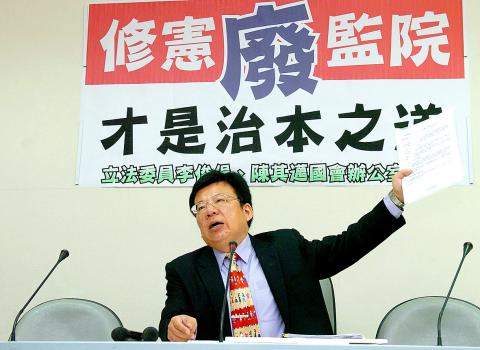Democratic Progressive Party (DPP) Legislator Lee Chun-yi (李俊俋) yesterday said he would propose a constitutional amendment to abolish the Control Yuan, saying it was time to change the current system of government with its five branches.
“Given the high threshold for a constitutional amendment to pass, [abolishing the Control Yuan] would be difficult, but I’m hoping that Chinese Nationalist Party (KMT) lawmakers would support the proposal to resolve the nation’s biggest problem,” Lee told a news conference.
“The biggest problem of this country is that all branches [of government] have come to a standstill,” he said, blaming it on a “flawed” system of government.

Photo: Wang Min-wei, Taipei Times
Lee said he has always advocated changing the five branches of government as provided in the Republic of China (ROC) Constitution to a Western-style three-power system by abolishing the Control Yuan and the Examination Yuan, leaving only the Executive Yuan, the Legislative Yuan and the Judicial Yuan.
ROC founding father Sun Yat-sen (孫逸仙) added the two traditional Chinese government branches to serve as a watchdog and supervise civil service examinations.
Sun’s design has created ambiguity of authority and responsibility among the different branches, Lee said, adding that the recent controversies surrounding the infighting at the Control Yuan has not helped either.
He was referring to the Control Yuan’s veto of the impeachment of Keelung Mayor Chang Tong-rong (張通榮), who has been convicted of influence peddling and interfering with police matters when he demanded that a woman detained for drunk driving be released, and the war of rhetoric between Control Yuan President Wang Chien-hsien (王建煊) and Control Yuan members.
Lee proposed transferring the rights of impeachment and censure to the Legislative Yuan, with three ombudsmen in charge of government monitoring, while the right of audit could be transferred either to an independent agency or a department of the Legislative Yuan.
Lee also recommended authorizing the Legislative Yuan, which currently only has the right of document request, with the right of investigation so that the legislative branch could handle all cases of inappropriate government practices with full authority.
As for public servants’ assets declaration, the task could be handled by the Agency Against Corruption at the Ministry of Justice, he said.
The proposal should have no problem passing the first phase, which requires the signatures of more than a quarter, or 29, of the 113-member legislature to launch the proposal. The next stage may be more difficult, as the proposal has to win the votes of more than three-quarters of the attendees in a legislative plenary before being sent to a national referendum.
DPP Legislator Chen Chi-mai (陳其邁) endorsed the proposal and said that concerns raised by several academics and KMT lawmakers about the amendment were unnecessary.
“Yes, we are trying to ‘overthrow Sun Yat-sen’s legacy’ like they said, but please be reminded that the same things had been said when the National Assembly was abolished. Did its abolition cause political instability?” Chen said.
Chen also played down the possibility that the three-power system would make the legislature a “constitutional monster” with too much power.
On Monday, the Taiwan Solidarity Union caucus also told a press conference that it would propose an amendment in the next legislative session to abolish the Control Yuan.

MAKING WAVES: China’s maritime militia could become a nontraditional threat in war, clogging up shipping lanes to prevent US or Japanese intervention, a report said About 1,900 Chinese ships flying flags of convenience and fishing vessels that participated in China’s military exercises around Taiwan last month and in January have been listed for monitoring, Coast Guard Administration (CGA) Deputy Director-General Hsieh Ching-chin (謝慶欽) said yesterday. Following amendments to the Commercial Port Act (商港法) and the Law of Ships (船舶法) last month, the CGA can designate possible berthing areas or deny ports of call for vessels suspected of loitering around areas where undersea cables can be accessed, Oceans Affairs Council Minister Kuan Bi-ling (管碧玲) said. The list of suspected ships, originally 300, had risen to about 1,900 as

Japan’s strategic alliance with the US would collapse if Tokyo were to turn away from a conflict in Taiwan, Japanese Prime Minister Sanae Takaichi said yesterday, but distanced herself from previous comments that suggested a possible military response in such an event. Takaichi expressed her latest views on a nationally broadcast TV program late on Monday, where an opposition party leader criticized her for igniting tensions with China with the earlier remarks. Ties between Japan and China have sunk to the worst level in years after Takaichi said in November that a hypothetical Chinese attack on Taiwan could bring about a Japanese

Right-wing political scientist Laura Fernandez on Sunday won Costa Rica’s presidential election by a landslide, after promising to crack down on rising violence linked to the cocaine trade. Fernandez’s nearest rival, economist Alvaro Ramos, conceded defeat as results showed the ruling party far exceeding the threshold of 40 percent needed to avoid a runoff. With 94 percent of polling stations counted, the political heir of outgoing Costa Rican President Rodrigo Chaves had captured 48.3 percent of the vote compared with Ramos’ 33.4 percent, the Supreme Electoral Tribunal said. As soon as the first results were announced, members of Fernandez’s Sovereign People’s Party

MORE RESPONSIBILITY: Draftees would be expected to fight alongside professional soldiers, likely requiring the transformation of some training brigades into combat units The armed forces are to start incorporating new conscripts into combined arms brigades this year to enhance combat readiness, the Executive Yuan’s latest policy report said. The new policy would affect Taiwanese men entering the military for their compulsory service, which was extended to one year under reforms by then-president Tsai Ing-wen (蔡英文) in 2022. The conscripts would be trained to operate machine guns, uncrewed aerial vehicles, anti-tank guided missile launchers and Stinger air defense systems, the report said, adding that the basic training would be lengthened to eight weeks. After basic training, conscripts would be sorted into infantry battalions that would take